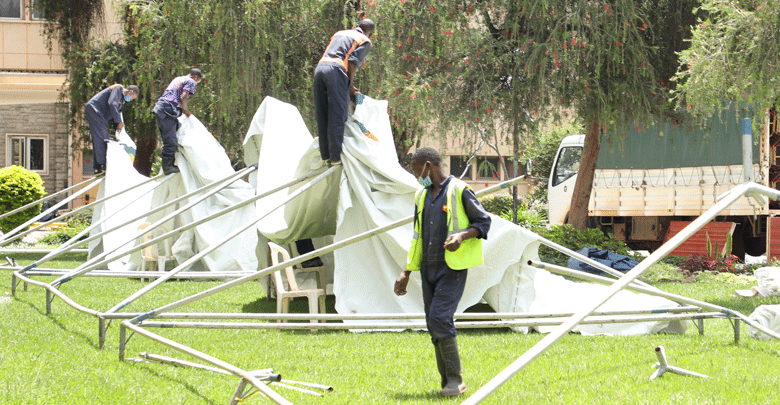70 new constituencies in focus as MPs debate BBI

Mercy Mwai @wangumarci
Fireworks is expected in Parliament today as lawmakers convene to debate the Building Bridges Initiative (BBI) Bill.
Lawmakers from the National Assembly and Senate were yesterday bracing themselves for a showdown when both Houses meet to discuss the Bill, with the controversy over the proposed creation of 70 new constituencies expected to take centre stage.
People Daily learnt that a section of MPs opposed to the creation of new electoral areas were lobbying their colleagues to shoot down the Bill by denying the National Assembly the requisite two thirds majority or at least 175 members to pass the report in its current form.
Whereas the Bill proposes creation of the 70 new electoral units spread across 28 counties, the joint legal committee of the National Assembly and Senate which considered it has termed the move unconstitutional as it would amount to usurping powers of the Independent Electoral and Boundaries Commission (IEBC).
Apparently privy to the sharp divisions among the lawmakers, the Orange Democratic Movement (ODM) yesterday issued a rallying call to its MPs and Senators to pass the Bill “as it is”.
New constituencies
“It is the party’s position that Parliament should pass the BBI Bill as it is, in it’s entirety,” said a statement issued by the party’s national chairman and Minority Leader in the National Assembly John Mbadi.
The sharp divisions among lawmakers emerged as the report of the joint Justice and Legal Affairs committee of the Senate and National Assembly revealed how various interest groups disagreed over creation of new constituencies when they appeared before the team.
“A number of stakeholders held the view that IEBC was the only entity vested with the constitutional mandate to delimit electoral units and the BBI taskforce had no role to play,” reads the committee’s report.
“Majority of the submissions on the proposal to create 70 new constituencies in the 28 counties were of the view that promoters of the Bill were usurping the powers of IEBC, while others argued that it was an opportunity to address the component of universal suffrage that each vote counts,” says the report.
The report shows that many stakeholders who presented their views to the committee, insisted that they be given an opportunity to amend the Bill and have the number of counties increased from 47 if the proposals to have the new constituencies would not be dropped.
Among the stakeholders who raised concerns are the Kenya National Bureau of Statistics (KNBS), IEBC, Kitui Senator Enoch Wambua, Bobasi MP Innocent Obiri, Ford Kenya party, Pastoralists Stakeholders Forum, Law Society of Kenya (LSK) President Nelson Havi, lawyer Kibe Mungai, Rota Foundation, The Youth Now Kenya and Youth Serving Organisations Consortium.
The stakeholders differed on the idea of demarcating the new constituencies six months ahead of next year’s general election, what data was relied upon in determination of the new constituencies and their allocation among 28 counties, as well as the designation of the electoral areas vis-a-vis the role of IEBC under Article 89 of the Constitution.
“It was a view of many stakeholders that the period of six months as proposed in the provision to delimit the constituencies and complete the exercise is inadequate, based on past experience and practice,” notes the report.
IEBC chairperson Wafula Chebukati is on record saying the task of allocating where the additional constituencies would be created belonged to IEBC and not politicians.
The joint committee, in its final report and supported by a majority of the members was categorical that creation of 70 new constituencies was unconstitutional.
KNBS was categorical that the number of new constituencies established should have been 68 and not 70 based on data obtained during the 2019 Kenya Population and Housing Census and the IEBC population threshold of 133,000 people per constituency.
Public participation
The agency said that six counties ought to have received more constituencies than those allocated to them in the Bill.
They include Meru which KNBS maintains deserved two additional constituencies instead of one while Kitui, Homa Bay and Kisii counties were entitled to one constituency each as opposed to the Bill which did not allocate them any.
The agency further submitted that Bungoma county was entitled to four new constituencies instead of three and Nairobi county 16 instead of 12.
KNBS further stated that eight counties ought to have lost one constituency each if the population threshold was applied. The eight include Tana River, Lamu, Taita Taveta Marsabit, Samburu, Elgeyo Marakwet, Baringo and Vihiga counties.
Kitui Senator Wambua submitted that there was a need to have an additional county to correct anomalies that happened during the Constitution review process.
He argued for creation of Mwingi county comprising the three Mwingi constituencies and Kitui East, excluding Nzambani ward that should revert to Kitui Central.
He also proposed the creation of two additional constituencies for Kitui county, one to be in Mwingi to take care of marginalised Tharaka/Thagicu sub-county and the other one to address the challenges of marginalisation in vast constituencies.
Bobasi MP Obiri, on his part, raised concerns that the Bill had introduced new constituencies in the 28 counties leaving out 19 which included his Bobasi constituency in Kisii county.
In his presentation, the legislator noted that there was no public participation in the process.














